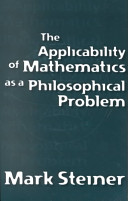

Most ebook files are in PDF format, so you can easily read them using various software such as Foxit Reader or directly on the Google Chrome browser.
Some ebook files are released by publishers in other formats such as .awz, .mobi, .epub, .fb2, etc. You may need to install specific software to read these formats on mobile/PC, such as Calibre.
Please read the tutorial at this link: https://ebookbell.com/faq
We offer FREE conversion to the popular formats you request; however, this may take some time. Therefore, right after payment, please email us, and we will try to provide the service as quickly as possible.
For some exceptional file formats or broken links (if any), please refrain from opening any disputes. Instead, email us first, and we will try to assist within a maximum of 6 hours.
EbookBell Team

0.0
0 reviewsMark Steiner distinguishes among the semantic problems that arise from the use of mathematics in logical deduction; the metaphysical problems that arise from the alleged gap between mathematical objects and the physical world; the descriptive problems that arise from the use of mathematics to describe nature; and the epistemological problems that arise from the use of mathematics to discover those very descriptions.
The epistemological problems lead to the thesis about the mind. It is frequently claimed that the universe is indifferent to human goals and values, and therefore, Locke and Peirce, for example, doubted science’s ability to discover the laws governing the humanly unobservable. Steiner argues that, on the contrary, these laws were discovered, using manmade mathematical analogies, resulting in an anthropocentric picture of the universe as “user friendly” to human cognition—a challenge to the entrenched dogma of naturalism.